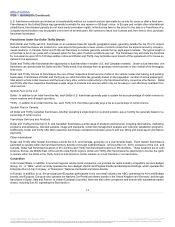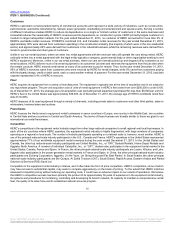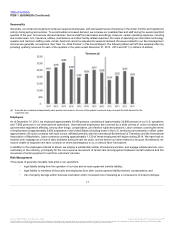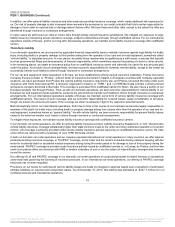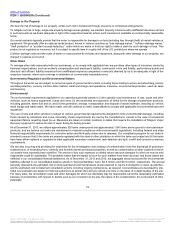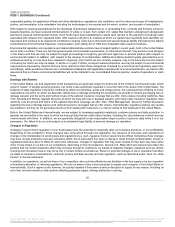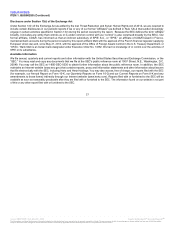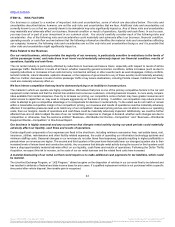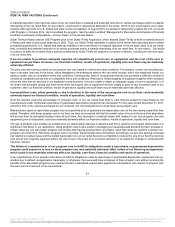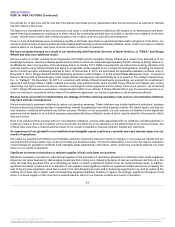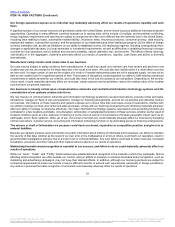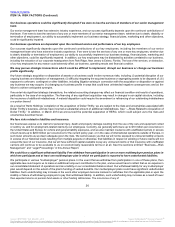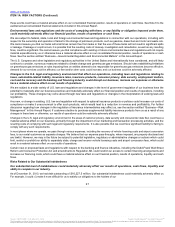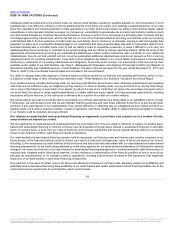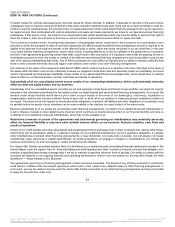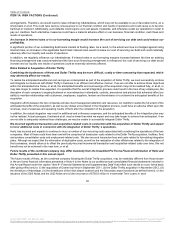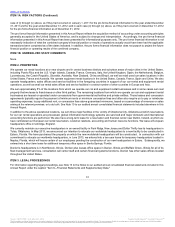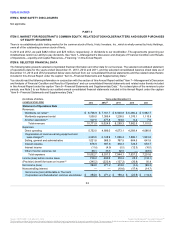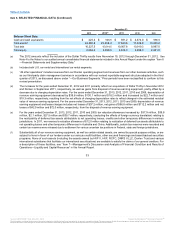Hertz 2013 Annual Report Download - page 26
Download and view the complete annual report
Please find page 26 of the 2013 Hertz annual report below. You can navigate through the pages in the report by either clicking on the pages listed below, or by using the keyword search tool below to find specific information within the annual report.
Table of Contents
A material reduction in the net book value of our car rental fleet, a material and extended reduction in vehicle purchases and/or a material
downsizing of our car rental fleet, for any reason, could result in reduced tax deferrals in the future, which in turn could require us to make
material cash payments for U.S. federal and state income tax liabilities. In August 2010, we elected to temporarily suspend the U.S. car rental
LKE Program. In October 2012, Hertz reinstated the program. See the section entitled “Management's Discussion and Analysis of Financial
Condition and Results of Operations—Income Taxes” in this Annual Report.
Dollar Thrifty similarly used an LKE Program prior to the Dollar Thrifty Acquisition, which allowed Dollar Thrifty to defer a material amount
of federal and state income taxes beginning in 2002. Thus, our Dollar Thrifty subsidiary is subject to the similar risks described above related
to material payments for U.S. federal and state tax liabilities in the event there is a material reduction in the net book value of its car rental
fleet, a material and extended reduction in its vehicle purchases and/or a material downsizing of its car rental fleet, for any reason. Our ability
to continue to defer the reversal of prior period tax deferrals by Dollar Thrifty will depend on a number of factors, including the net book value
of its car rental fleet.
If we are unable to purchase adequate supplies of competitively priced cars or equipment and the cost of the cars or
equipment we purchase increases, our financial condition, results of operations, liquidity and cash flows may be materially
adversely affected.
The price and other terms at which we can acquire cars vary based on market and other conditions. For example, certain car manufacturers
have in the past, and may in the future, utilize strategies to de-emphasize sales to the car rental industry, which can negatively impact our
ability to obtain cars on competitive terms and conditions. Consequently, there is no guarantee that we can purchase a sufficient number of
vehicles at competitive prices and on competitive terms and conditions. Reduced or limited supplies of equipment together with increased
prices are risks that we also face in our equipment rental business. If we are unable to obtain an adequate supply of cars or equipment, or if
we obtain less favorable pricing and other terms when we acquire cars or equipment and are unable to pass on any increased costs to our
customers, then our financial condition, results of operations, liquidity and cash flows may be materially adversely affected.
Increased fleet costs, either generally or due to declines in the value of the non-program cars in our fleet, could materially
adversely impact our financial condition, results of operations, liquidity and cash flows.
Over the last few years the percentage of ‘‘program cars’’ in our car rental fleet (that is, cars that are subject to repurchase by car
manufacturers under contractual repurchase or guaranteed depreciation programs) has decreased. For the years ended December 31, 2013
and 2012, 30% of the vehicles purchased for our combined U.S. and international car rental fleets were program cars.
Manufacturers agree to repurchase program cars at a specified price or guarantee the depreciation rate on the cars during a specified time
period. Therefore, with fewer program cars in our fleet, we have an increased risk that the market value of a car at the time of its disposition
will be less than its estimated residual value at such time. Any decrease in residual values with respect to our non-program cars and
equipment (prior to disposition) could also materially adversely affect our financial condition, results of operations, liquidity and cash flows.
The use of program cars enables us to determine our depreciation expense in advance and this is useful to us because depreciation is a
significant cost factor in our operations. Using program cars is also useful in managing our seasonal peak demand for fleet, because in
certain cases we can sell certain program cars shortly after having acquired them at a higher value than what we could for a similar non-
program car at that time. With fewer program cars in our fleet, these benefits have diminished. Accordingly, we are now bearing increased
risk relating to residual value and the related depreciation on our car rental fleet and our flexibility to reduce the size of our fleet by returning
cars sooner than originally expected without the risk of loss in the event of an economic downturn or to respond to changes in rental demand
has been reduced.
The failure of a manufacturer of our program cars to fulfill its obligations under a repurchase or guaranteed depreciation
program could expose us to loss on those program cars and materially adversely affect certain of our financing arrangements,
which could in turn materially adversely affect our liquidity, cash flows, financial condition and results of operations.
If any manufacturer of our program cars does not fulfill its obligations under its repurchase or guaranteed depreciation agreement with us,
whether due to default, reorganization, bankruptcy or otherwise, then we would have to dispose of those program cars without receiving the
benefits of the associated programs (we could be left with a substantial unpaid claim against the manufacturer with respect to program cars
that were sold and returned to the manufacturer
23
Source: HERTZ CORP, 10-K, March 31, 2014 Powered by Morningstar® Document Research℠
The information contained herein may not be copied, adapted or distributed and is not warranted to be accurate, complete or timely. The user assumes all risks for any damages or losses arising from any use of this information,
except to the extent such damages or losses cannot be limited or excluded by applicable law. Past financial performance is no guarantee of future results.


